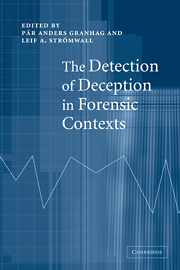Book contents
- Frontmatter
- Contents
- List of figures
- List of tables
- List of contributors
- Part 1 Introduction
- Part 2 Lie-detection techniques
- Part 3 Special issues facing a lie-catcher
- Part 4 Enhancing lie-detection accuracy
- 10 Practitioners' beliefs about deception
- 11 Training to detect deception from behavioural cues: attempts and problems
- 12 The wizards of deception detection
- 13 Guidelines to catch a liar
- Part 5 Conclusions
- Index
- References
13 - Guidelines to catch a liar
Published online by Cambridge University Press: 22 September 2009
- Frontmatter
- Contents
- List of figures
- List of tables
- List of contributors
- Part 1 Introduction
- Part 2 Lie-detection techniques
- Part 3 Special issues facing a lie-catcher
- Part 4 Enhancing lie-detection accuracy
- 10 Practitioners' beliefs about deception
- 11 Training to detect deception from behavioural cues: attempts and problems
- 12 The wizards of deception detection
- 13 Guidelines to catch a liar
- Part 5 Conclusions
- Index
- References
Summary
A Warning
The guidelines which will be presented in this chapter are based upon psychological principles and research regarding deception and lie detection (I will use the words ‘lying’ and ‘deception’ interchangeably throughout this chapter). Most studies are conducted in university laboratory situations where people are asked to lie for the sake of the experiment. This might be seen as a serious limitation, as lying for the sake of the experiment might well be totally different from lying in police interviews. This issue will be addressed throughout the guidelines where relevant.
Introduction
Research has convincingly demonstrated that catching liars is a difficult task and that people, including professional lie-catchers, frequently make mistakes when they attempt to detect deceit (Vrij, 2000a). In scientific studies concerning the detection of deception, observers are typically given videotaped or audiotaped statements of a number of people who are either lying or telling the truth. After each statement, observers (typically college students) are asked to judge whether the statement is truthful or false. In such tasks, guessing whether someone is lying or not gives a 50 per cent chance of being correct. Vrij (2000a) has reviewed thirty-seven lie-detection studies in which the observers were college students. The total accuracy rate, the percentage of correct answers, was 56.6 per cent, which is only just about the level of chance.
Information
- Type
- Chapter
- Information
- The Detection of Deception in Forensic Contexts , pp. 287 - 314Publisher: Cambridge University PressPrint publication year: 2004
References
Accessibility standard: Unknown
Why this information is here
This section outlines the accessibility features of this content - including support for screen readers, full keyboard navigation and high-contrast display options. This may not be relevant for you.Accessibility Information
- 23
- Cited by
